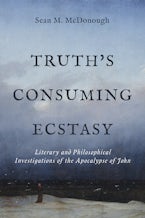The book of Revelation is strange, to put it mildly. An informed reading reveals John’s pastoral intent is very much in keeping with typical New Testament instruction regarding God, Jesus, and the life that Christ followers are meant to live in the face of seductive idolatry and intense oppression. With a message so simple, why would John cloud it over with a perplexing cluster of images that only seems to obscure the reader’s vision?
In Truth’s Consuming Ecstasy, Sean McDonough accounts for the strangeness of the book of Revelation by placing John in dialogue with a wide-ranging group of thinkers--giants of philosophy, literature, and theology. Comparisons with Plato reveal John’s sweeping vision of the cosmos as a philosophically defensible approach. But does this overarching view render the Apocalypse a "totalizing" document--a tool of oppression? In response McDonough turns to Ludwig Wittgenstein, with whose assistance we recognize that Revelation conceals as much as it reveals, and so avoids the totalizing charge. McDonough presents W. B. Yeats as a poet who functions in the apocalyptic mode--though his particular brand of apocalyptic swerves in a gnostic direction, in keeping with the heritage of his Romantic forebears. J. R. R. Tolkien, by contrast, takes the reader on an apocalyptic journey rooted in Catholic doctrine, but he approaches his task with a Wittgensteinian reserve and lets the story carry the message without sermonizing. The final section engages two theologians whose work has been characterized as apocalyptic: the Russian Orthodox Sergius Bulgakov and the Catholic Hans Urs von Balthasar. Revelation opens up the imaginative space in which they pursue the grand themes of theology.
The imaginative, visionary discourse of Revelation offers us the reach, but not the grasp, of the depths of reality. From John’s mystical and mystifying perspective--a philosophical, literary, and theological hybrid--we learn about the purposes of God for the world, but in a certain puzzling way that is meant to check our hubris.

